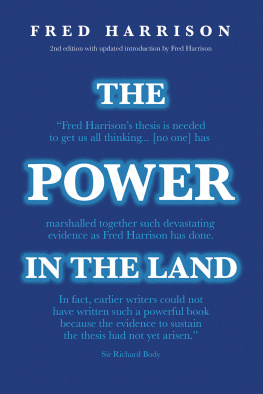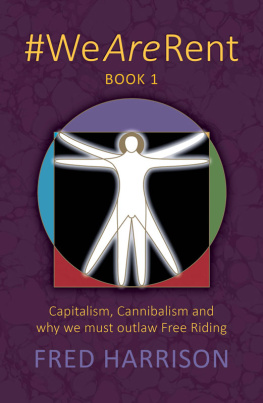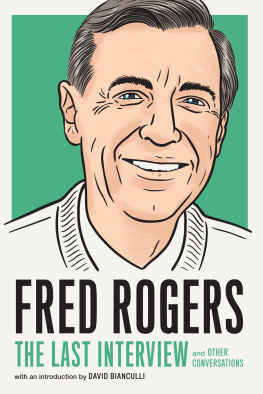Fred Harrison - The Power In the Land
Here you can read online Fred Harrison - The Power In the Land full text of the book (entire story) in english for free. Download pdf and epub, get meaning, cover and reviews about this ebook. publisher: Shepheard Walwyn Publishers, genre: Politics. Description of the work, (preface) as well as reviews are available. Best literature library LitArk.com created for fans of good reading and offers a wide selection of genres:
Romance novel
Science fiction
Adventure
Detective
Science
History
Home and family
Prose
Art
Politics
Computer
Non-fiction
Religion
Business
Children
Humor
Choose a favorite category and find really read worthwhile books. Enjoy immersion in the world of imagination, feel the emotions of the characters or learn something new for yourself, make an fascinating discovery.
- Book:The Power In the Land
- Author:
- Publisher:Shepheard Walwyn Publishers
- Genre:
- Rating:5 / 5
- Favourites:Add to favourites
- Your mark:
- 100
- 1
- 2
- 3
- 4
- 5
The Power In the Land: summary, description and annotation
We offer to read an annotation, description, summary or preface (depends on what the author of the book "The Power In the Land" wrote himself). If you haven't found the necessary information about the book — write in the comments, we will try to find it.
The Power In the Land — read online for free the complete book (whole text) full work
Below is the text of the book, divided by pages. System saving the place of the last page read, allows you to conveniently read the book "The Power In the Land" online for free, without having to search again every time where you left off. Put a bookmark, and you can go to the page where you finished reading at any time.
Font size:
Interval:
Bookmark:

THE POWER IN THE LAND
It does not matter where you look or what examples you select, you will see that every form of enterprise, every step in material progress, is only undertaken after the land monopolist has skimmed the cream off for himself, and everywhere today the man of the public body who wishes to put land to its highest use is forced to pay a preliminary fine in land values to the man who is putting it to an inferior use, and in some cases to no use at all. All comes back to the land value, and its owner for the time being is able to levy his toll upon all other forms of wealth and upon every form of industry. A portion, in some cases the whole, of every benefit which is laboriously acquired by the community is represented in the land value, and finds its way automatically into the landlords pocket. If there is a rise in wages, rents are able to move forward, because the workers can afford to pay a little more. If the opening of a new railway or a new tramway or the institution of an improved service of workmens trains or a lowering of fares or a new invention of any other public convenience affords a benefit to the workers in any particular district, it becomes easier for them to live, and therefore the landlord and the ground landlord, one on top of the other, are able to charge them more for the privilege of living there.
W INSTON S. C HURCHILL , in a speech in Edinburgh,
July 17, 1909
Published in the United States of America in 1983
by Universe Books
381 Park Avenue South, New York, N.Y. 10016
Fred Harrison, 1983
First published in the United Kingdom by
Shepheard-Walwyn (Publishers) Ltd, London, 1983
All rights reserved. No part of this publication
may be reproduced, stored in a retrieval system,
or transmitted, in any form or by any means,
electronic, mechanical, photocopying, recording, or
otherwise, without prior permission of the publishers.
ISBN 0 87663-424-2
83 84 85 86 87 / 10 9 8 7 6 5 4 3 2 1
Printed in the United Kingdom
Acknowledgements
This book would have been written by Vic Blundell, but for his lifelong dedication to the instruction of mature students who have sought solutions to social problems through an understanding of the science of political economy. The duty to write the book, then, fell to one of his pupils, and it is with pleasure that I express my deep gratitude to him for the generous help that he gave me in the development of some of the key ideas contained in this work.
Some of the research was undertaken while globe-trotting on assignments for my newspaper, The Sunday People. A succession of Editors have flown me to locations that made it possible to witness at first hand the workings of the land market in places as diverse as Hong Kong and Sydney, Athens and Kingston (Jamaica). When the Sunday deadlines were met, I was able to switch to on-the-spot investigations that extended my appreciation that the world is one single economy, and that we must work together to find solutions that will serve the common interest. I thank my Editors, whose unwitting role in the production of this book absolves them from any responsibility for the views expressed herein.
Many people helped me during my travels, and I would particularly like to acknowledge the assistance received from Walter Rybeck in Washington, Allan Hutchinson in Melbourne and the late Professor Philip Finkelstein in New York.
Writing is the most civilising of mans arts, but for its dedicated practitioners it is also the most anti-social. And so I record with humility my greatest debt, which is to my wife Rita and daughter Nina, who bore my absence from family routines with fortitude.
Contents
THE UNFREE MARKET
1
The Fatal Mistake
When Mae West told reporters I never say No! to a good offer, she was not adding yet another one of those sexually suggestive throwaway phrases to the list that made the Hollywood actress famous. She was referring to the land deals that enabled her to build a fortune estimated at around $45m. Her wheeling-dealing gave the late Miss West a mysterious influence which was immeasurably more powerful than her ability to attract men with her celluloid sex. For deals such as those she shrewdly executed in Californias San Fernando Valley are at the source of the problem that periodically afflicts the global economy.
The honey-tongued actress commanded the power to disrupt the productive process because industrial society, quite simply, was built on a mistake. The free market, which Adam Smith called the invisible hand, was supposed to be the guiding mechanism which equalised the multiplicity of interests and decisions in the economy; it was supposed to aggregate these in such a way that the potential conflicts between private goals would be removed within a harmonious social framework. The mistake made by the founding fathers of the Industrial Revolution in the 1780s the inventors of new-fangled machines and the entrepreneurs who capitalised on the new factory-based processes of mass production was to accept and institutionalise land monopoly. The British people, from the Clyde in Scotland to the Thames in the south-eastern corner of England, brought together human skills and material resources in a unique combination, and built a new economic edifice on a corrupt foundation. The good life for all was technically capable of achievement, but was not allowed to be fully realised.
The 1980s are the bicentenary of that quantum jump which was the Industrial Revolution. However, that event, unparalleled in the history of mankind, is recalled not for the pleasing possibilities that it offered, but for the exploitation which ruptured economic relationships and generated social tensions. Over thirty million people are jobless in the industrialised countries; hundreds of millions more, dependent upon the prosperity of the metropolitan economies for their jobs, are also tramping the streets in the big cities of the Third World. Those who are fortunate enough to be taking home wage packets at the end of the week are nonetheless living with the constant fear that they are the next to be made redundant.
Entrepreneurs from the captains of multi-national corporations to the self-employed shopkeepers who keep the wheels of commerce ticking over in the corner shops of our High Streets are equally vulnerable to the pressures of a seemingly pitiless economic system that appears to jeopardise their material welfare no matter how hard they are willing to work.
Everyone is vulnerable, whether he is a capitalist or worker, whether he lives in the miracle economies of West Germany or Japan or the low- productivity countries like Britain. Could it be that the only appropriate response to the malignant forces that undermine the great social institutions and the nuclear family alike is a thoroughgoing revolution Marxism, perhaps?
The major social and economic friction points derive their existence and logic from the need to compensate for land monopoly, the original structural defect in industrial society. Economists have always skirted around this issue, and have thus been led by a variety of motives, some honourable (such as humanitarianism), some inspired by the need to protect vested interests to propose solutions that have merely aggravated the problems. For example, 19th century reformers concluded that poverty could be eliminated through a progressive income tax only; this failed, as the large number of poverty stricken families in the rich nations of Europe and North America would testify (in 1981, 30m. citizens of the richest nation on earth, the USA, were officially classified as living below the poverty line).
Next pageFont size:
Interval:
Bookmark:
Similar books «The Power In the Land»
Look at similar books to The Power In the Land. We have selected literature similar in name and meaning in the hope of providing readers with more options to find new, interesting, not yet read works.
Discussion, reviews of the book The Power In the Land and just readers' own opinions. Leave your comments, write what you think about the work, its meaning or the main characters. Specify what exactly you liked and what you didn't like, and why you think so.













